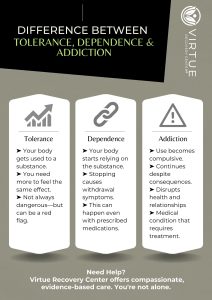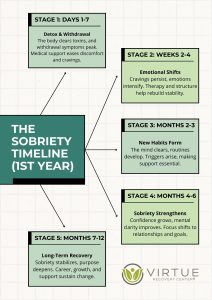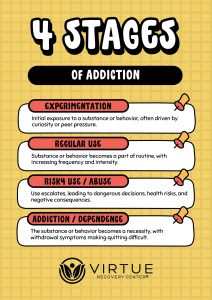Key Takeaways
- Burnout and relapse are common challenges in addiction recovery, but both can be prevented.
- Recognizing burnout early helps prevent emotional exhaustion and relapse risks.
- A strong support network reduces stress and promotes sustained recovery.
- Self-care and mindfulness play a vital role in avoiding burnout and maintaining well-being.
- Relapse prevention strategies include recognizing triggers, managing stress, and staying engaged in recovery.
Introduction
Recovery is a journey that requires ongoing commitment. Achieving sobriety is an important milestone, but maintaining it comes with its own set of challenges. Many people experience burnout, a state of emotional, physical, and mental exhaustion that can make recovery feel overwhelming. Others struggle with cravings and triggers that increase their risk of relapse.
Burnout in addiction recovery often develops gradually. It can cause fatigue, anxiety, and frustration, making it harder to stay focused on sobriety. At the same time, relapse rarely happens suddenly. It begins with emotional distress, progresses into mental struggles, and eventually leads to substance use. Recognizing the warning signs of burnout and relapse is crucial to preventing setbacks.
Understanding how to manage stress, maintain motivation, and avoid high-risk situations can help strengthen long-term sobriety. Individuals can protect their well-being and reduce the likelihood of relapse by focusing on self-care and healthy coping strategies.
Understanding Burnout in Addiction Recovery
Burnout occurs when stress and exhaustion take a toll on a person’s physical and mental health. In addiction recovery, burnout can make a person feel drained, unmotivated, or emotionally disconnected. Many people push themselves too hard, expecting perfection in their sobriety. When challenges arise, they may feel discouraged, which can lead to emotional exhaustion.
Burnout can manifest in different ways. Some people experience physical symptoms such as fatigue, headaches, and trouble sleeping. Others struggle with emotional distress, including mood swings, irritability, or feelings of hopelessness. Mentally, burnout can make it difficult to concentrate, stay motivated, or find enjoyment in life.
If burnout is left unaddressed, it can weaken a person’s ability to handle stress or cravings. Many individuals who relapse report feeling overwhelmed or emotionally exhausted before returning to substance use. Identifying and addressing burnout early is one of the most effective ways to prevent relapse.
Recognizing Relapse Warning Signs
Relapse is a process that unfolds in stages. It usually begins with emotional distress, progresses into mental struggles, and, if not addressed, leads to physical relapse.
The first stage is emotional relapse, where a person may experience stress, anxiety, or isolation. They might stop prioritizing self-care, withdraw from loved ones, or suppress their emotions. If these feelings go unchecked, the risk of moving into mental relapse increases.
During mental relapse, a person begins struggling with thoughts about substance use. They may start romanticizing past drug or alcohol use, feeling nostalgic about old habits, or even planning ways to use again. If these thoughts continue, they can turn into action.
Physical relapse is the final stage, where a person returns to substance use. While some individuals may view a single slip as a minor setback, it can quickly escalate into full relapse if not properly managed.
Triggers such as stress, boredom, loneliness, and exposure to substance-use environments can increase relapse risk. Recognizing these warning signs early allows individuals to take action before relapse occurs.
Strategies to Prevent Burnout in Recovery
Preventing burnout requires maintaining balance in recovery. While sobriety is important, it should not feel like a constant struggle. Taking time for self-care and setting realistic expectations can help create a sustainable recovery process.
Rest and relaxation are essential. Many people in recovery experience sleep disturbances, which can contribute to burnout. Establishing a consistent sleep routine and allowing time for relaxation can improve both mental and physical well-being.
Physical health also plays a role in recovery. Regular exercise and a healthy diet can provide energy, reduce stress, and improve mood. Engaging in activities such as walking, yoga, or strength training can help support overall well-being.
Mindfulness practices are another effective tool for preventing burnout. Deep breathing, meditation, and journaling can help individuals stay present and manage stress. Expressing emotions in a healthy way can also prevent frustration from building up over time.
Engaging in hobbies and creative outlets can bring joy and fulfillment to life in recovery. Whether it’s painting, writing, playing music, or volunteering, finding activities that provide meaning can help prevent feelings of stagnation.
If burnout starts affecting daily life, seeking support is crucial. Talking to a therapist, counselor, or recovery coach can provide guidance and reassurance. Support groups and sober communities also offer encouragement and connection.
Relapse Prevention Strategies for Lasting Sobriety
Preventing relapse involves staying proactive. One of the most important factors in relapse prevention is developing strong coping strategies for stress, negative emotions, and cravings.
A reliable support network is essential in recovery. Surrounding oneself with positive influences—such as sober friends, family, and recovery groups—can provide accountability and motivation. Isolation often leads to relapse, so staying connected to others helps reinforce sobriety.
Recognizing and managing triggers is also key. Avoiding high-risk situations, such as social gatherings where substances are present, can reduce temptation. For stress-related triggers, using healthy coping mechanisms like deep breathing, physical activity, or talking to a trusted friend can make a difference.
Maintaining structure and routine in daily life supports long-term sobriety. Setting achievable goals and developing healthy habits creates stability and purpose. Whether it’s working, pursuing education, or engaging in personal growth activities, having a clear direction can keep motivation strong.
Long-term recovery is not just about avoiding substances—it’s about building a meaningful life without them. Staying engaged in recovery activities, finding new passions, and working toward future goals can help sustain sobriety.
How to Stay Motivated in Long-Term Recovery
Over time, staying sober may feel easier, but maintaining motivation is just as important. Recovery is not about perfection—it’s about progress. Every milestone, no matter how small, is worth celebrating.
Finding purpose in sobriety can help maintain long-term commitment. Many individuals find meaning in helping others, whether through mentorship, volunteer work, or sharing their recovery journey. Supporting others in recovery can also reinforce personal motivation.
Support groups and recovery meetings provide ongoing encouragement. Even after years of sobriety, staying connected to a recovery community can serve as a reminder of why sobriety matters. Being part of a group also provides guidance and reassurance during difficult times.
Challenges will arise in recovery, but preparing for them can prevent setbacks. By recognizing that obstacles are part of the process, individuals can stay focused on their long-term goals. With the right mindset and support, lasting sobriety is achievable.
Conclusion: Preventing Relapse and Burnout for a Lasting Recovery
Burnout and relapse are common challenges in addiction recovery, but they are not inevitable. Recognizing the warning signs, prioritizing self-care, and building a strong support network can make a significant difference. Recovery is a lifelong journey, but with the right tools and mindset, it can be a fulfilling and successful experience.
If you or a loved one is struggling with addiction, Virtue Recovery Las Vegas is here to help. Our personalized treatment programs provide the guidance and resources needed for lasting sobriety.
Call 866-520-2861 today to take the next step in your recovery journey!
FAQs
What are the signs of burnout in addiction recovery?
Burnout can include emotional exhaustion, lack of motivation, trouble sleeping, and feeling overwhelmed.
How can I prevent relapse while dealing with stress?
Using healthy coping strategies such as deep breathing, journaling, talking to a support network, and practicing mindfulness can help manage stress effectively.
Is relapse a sign of failure in recovery?
No, relapse is a common part of many recovery journeys. The key is to seek support, learn from the experience, and continue working toward sobriety.
What should I do if I feel burned out in recovery?
Take a step back and focus on self-care. Engage in activities that bring joy, talk to a counselor, and reassess your recovery goals to prevent burnout from escalating.
How can I stay motivated in long-term recovery?
Stay connected with a support network, celebrate progress, find meaningful activities, and remind yourself why sobriety is important to you.
Resources
https://www.ncbi.nlm.nih.gov/books/NBK551500/
https://www.flcourts.gov/content/download/732700/file/RELAPSE
https://www.va.gov/WHOLEHEALTHLIBRARY/tools/reducing-relapse-risk.asp













